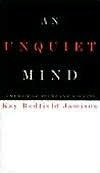More on this book
Community
Kindle Notes & Highlights
It took me far too long to realize that lost years and relationships cannot be recovered, that damage done to oneself and others cannot always be put right again, and that freedom from the control imposed by medication loses its meaning when the only alternatives are death and insanity.
The major clinical problem in treating manic-depressive illness is not that there are not effective medications—there are—but that patients so often refuse to take them.
an illness that is unique in conferring advantage and pleasure, yet one that brings in its wake almost unendurable suffering and, not infrequently, suicide.
They were less than transfixed by my insights into the webbings and beauties of the universe, although considerably impressed by how exhausting it was to be around my enthusiastic ramblings: You’re talking too fast, Kay. Slow down, Kay. You’re wearing me out, Kay. Slow down, Kay. And those times when they didn’t actually come out and say it, I still could see it in their eyes: For God’s sake, Kay, slow down.
My thinking, far from being clearer than a crystal, was tortuous. I would read the same passage over and over again only to realize that I had no memory at all for what I just had read. Each book or poem I picked up was the same way. Incomprehensible. Nothing made sense. I could not begin to follow the material presented in my classes, and I would find myself staring out the window with no idea of what was going on around me. It was very frightening.
It was incapable of concentrated thought and turned time and again to the subject of death: I was going to die, what difference did anything make? Life’s run was only a short and meaningless one, why live? I was totally exhausted and could scarcely pull myself out of bed in the mornings. It took me twice as long to walk anywhere as it ordinarily did, and I wore the same clothes over and over again, as it was otherwise too much of an effort to make a decision about what to put on. I dreaded having to talk with people, avoided my friends whenever possible, and sat in the school library in the
...more
to disguise the pain. I made not just an effort, but an enormous effort not to be noticed. I knew something was dreadfully wrong, but I had no idea what, and I had been brought up to believe that you kept your problems to yourself.
But then as night inevitably goes after the day, my mood would crash, and my mind again would grind to a halt. I lost all interest in my schoolwork, friends, reading, wandering, or daydreaming. I had no idea of what was happening to me, and I would wake up in the morning with a profound sense of dread that I was going to have to somehow make it through another entire day.
I got as far as the stairwell just outside the clinic but was only able to sit there, paralyzed with fear and shame, unable to go in and unable to leave.
I had a glorious—as it turns out, too glorious—summer, and, within three months of becoming a professor, I was ravingly psychotic.
But, somewhere, this changes. The fast ideas are far too fast, and there are far too many; overwhelming confusion replaces clarity. Memory goes. Humor and absorption on friends’ faces are replaced by fear and concern. Everything previously moving with the grain is now against—you are irritable, angry, frightened, uncontrollable, and enmeshed totally in the blackest caves of the mind. You never knew those caves were there. It will never end, for madness carves its own reality.
I can’t calm this murderous cauldron, my grand ideas of an hour ago seem absurd and pathetic, my life is in ruins and—worse still—ruinous; my body is uninhabitable. It is raging and weeping and full of destruction and wild energy gone amok. In the mirror I see a creature I don’t know but must live and share my mind with.


